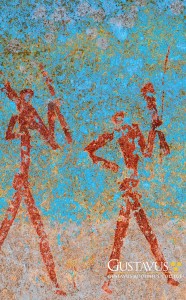
Gustavus is known nationwide as the first institution in the United States to have the official authorization of the Nobel Foundation in Stockholm, Sweden, to hold an educational conference each year. Its aim, according to the Gustavus website, is to “link a general audience with the world’s foremost scholars and researchers in conversations centered on contemporary issues related to the natural and social sciences.”
The discussion this year will revolve around human evolution, tand trace human history from its origins in Africas to modern times.
“The annual Nobel conferences are noted for timely and constructive discussions of important scientific and socialissues,” said Nobel Conference Director Tim Robinson.
This is a unique opportunity for students, alumni, and members of the outside community to learn about human evolution from experts on the topic.
The Nobel Conference will open on Tuesday, Oct. 7 with a welcome from President Ohle. Also speaking Tuesday will be Curtis Marean, Svante Paablo and Marcus Feldman.
“In an effort to encourage open discourse and critical thought, students have taken initiative to bring in speaker Jon Kaus to present a lecture titled ‘Evolution Exposed: A Creationist’s Look at the Evidence.'” Kaus will speak in Wallenberg Auditorium at 6:00 p.m. following the lectures.
Wednesay, Oct. 8 will bring lectures from Dennis Stanford, Robert Dunbar and J. Wentzel van Huyssteen.
Each of the lecturers is highly advanced in his respective field. Svante Paablo offered a few words on his passion: “Ever since I was a boy I wanted to be an archaeologist and Egyptologist, so I started studying Egyptology at the University. . . I studied medicine and molecular biology. As a grad student [I] found that I had helped start a new little field of study-the retrieval of DNA from old tissue remains.”
Other experts speaking at the conference include Dennis Stanford, the Head of the Division of Archaeology of the Smithsonian National Museum of Natural History. Stanford will be speaking on “The Ice-Age Discovery of America”.
Speaker Robin Dunbar, the Director of the Institute of Cognitive and Evolutionary Anthropology at Oxford University, will focus on “Mind[ing] the Gap:Why Humans Aren’t Just Great Apes”.
The conference is “the essence of liberal arts being showcased,” said Joel Carlin, a member of the Nobel planning committee.
“I feel that the topic this year is more applicable and more interesting to the general public than it has been in previous years,” said Emily Johnson, a senior sociology major.
Senior Art Major Tania Schueller had a similar opinion, commenting that human evolution is “a piece of history that every person is connected to.”
“I’m really interested in all the talks,” Carlin said. He went on to say, “I believe that evolution is absolutely real-that the phenomenon is as real as photosynthesis or the Earth orbiting the sun.”
“It is a cool opportunity to see how science is done and how investigations are conducted,” said Carlin.
Tickets for Gustavus students can be picked up at the Student Activities Office in the lower level of the Campus Center.One complimentary ticket is provided for each Gustavus student.
Non-students can mail ticket orders to the college or order them online at www.gustavus.edu/nobelconference. Individual tickets for non-students cost 45 dollars.
What a wonderful article and so well written.